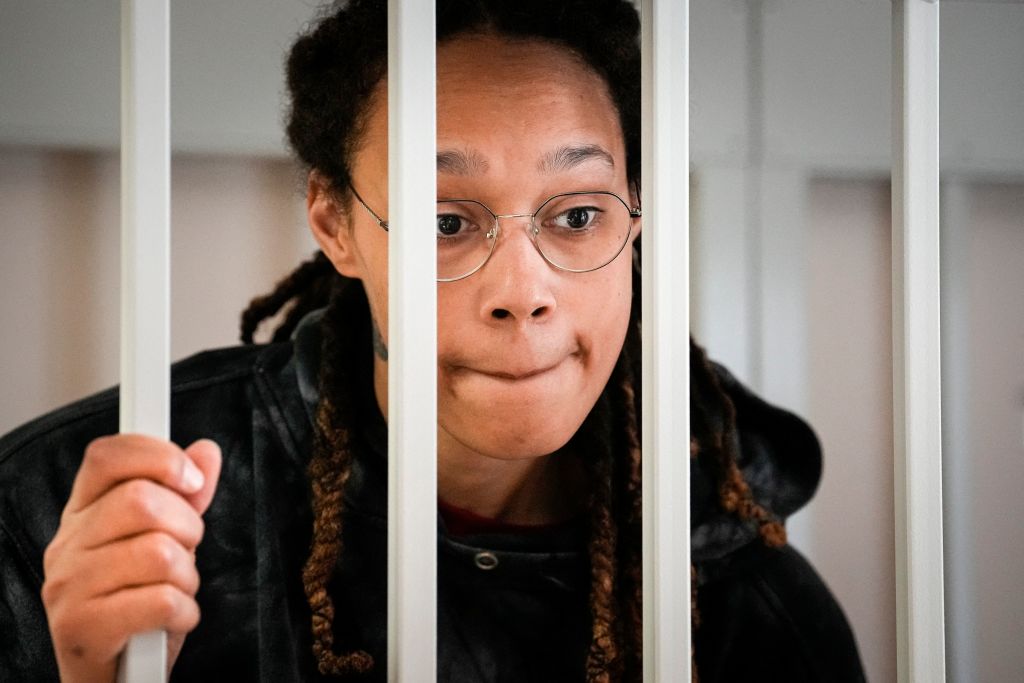American basketball star Brittney Griner touched down in her home state of Texas on Friday after nearly a year in Russian custody, avoiding a nine-year sentence—what the State Department considered a wrongful detention—for transporting cannabis oil. In exchange for her release, the U.S. turned over Russian arms dealer Viktor Bout, who had been serving 25 years in an American prison for aiding and abetting war crimes.
Some experts don’t think it was a fair trade.
Among them is Alex Plitsas, who worked as the secretary of defense’s representative to the 2015 White House Hostage Policy Review Team and continues to advocate on behalf of captive Americans worldwide. His efforts in 2015 led to the creation of the Hostage Recovery Fusion Cell—which coordinates interagency hostage recovery efforts—and the position of special presidential envoy for hostage affairs.
In an interview with The Dispatch, Plitsas argued that trading a civilian like Griner for a convicted terrorist like Bout sets a dangerous precedent. Below is our conversation, edited for length and clarity.
What were some of the major problems with the one-for-one swap—Griner for Bout?
When we have folks detained on trumped-up charges of nonsense, and we’re now handing over an internationally recognized arms dealer who’s sold to everybody from Hezbollah to Hamas to the Taliban, it’s problematic. Because now we equate that guy and his capabilities and the number of people he’s killed—he’s known as the “merchant of death”—to a woman who was a WNBA player who knowingly transported cannabis products. While the sentence may have been excessive, it’s not an appropriate one-for-one swap.
Bout has been in prison for about 15 years, but Russia is at war and there’s a general shortage of Soviet-caliber munitions, ammunition, and equipment, and one of the world’s most notorious arms dealers is now being handed literally back to the Russians. They would have asked for him in exchange for a reason.
What are the potential unintended consequences of involving civilians in exchanges?
It’s setting precedent from a policy perspective. First you had Bashir Noorzai released for Mark Frerichs in Afghanistan. Mark was an innocent civilian who had done nothing wrong. Bashir Noorzai was arrested as an international drug trafficker out of Afghanistan, an early funder of the Taliban movement. When Mark Frerichs’ name became public, the Noorzai tribe demanded that Bashir be released.
So we’ve now had multiple swaps over the course of the last year in which innocent civilians who were detained, either without charges or under false charges, have been swapped for either international drug traffickers or international arms dealers who have done significant harm to the global community. When you do things like that, it basically tells rogue actors—state and non-state actors—that if you are about to detain an American, particularly an innocent civilian, the days of no concessions are off the table. Now they are willing to swap for individuals who have committed crimes or acts against the state. That’s just not something that’s been done or supported historically.
The U.S. has a lot of potential carrots to offer rogue states that take Americans prisoner. What sticks can it use to make sure hostage-taking doesn’t become policy for its adversaries?
The tools at the government’s disposal span what we call the DIME paradigm: diplomatic, information, military, economic. At some point, when you’ve tapped out on sanctions, what are you left with? Obviously military action is not something anybody wants to see.
For Griner to be detained and then imprisoned for cannabis products that she brought into the country—there’s a calculated decision that goes into those sentences. We all know that this was a politically motivated sentence, which means the government was involved. Somebody in the Russian government at a very senior level would have to look at that case and render a determination that the juice is worth the squeeze—sticking her in prison for 10 years to get what they want is going to be better for them in the long-run than any potential ramifications they can receive.
So that’s the real problem. It already tells you that there’s a lack of deterrence.
With a country like Afghanistan that has no international recognition, you can’t threaten to withdraw diplomats or inflict any sort of diplomatic pain that you haven’t already in dealing with a group like the Taliban.
That’s the problem when you end up with the Taliban or North Korea when they had Otto Warmbier murdered. They’re already sanctioned to holy hell—there’s no diplomatic relations between the two countries to break—so your sticks are limited.
For international hostage-taking scenarios, one of our counterterrorism units that specializes in hostage rescue—one in the Navy and one in the Army—will take primary responsibility, provided that intelligence is able to indicate where exactly those folks are being held, that the place that they’re being held is somewhere we can actually physically get to, and that we’ve made a reasonable determination that we can get the people out safely without hurting them. That’s very different when you’re talking about a state actor, because now you’re talking about going into a sovereign nation and raiding a prison somewhere.
It’s really a bizarre situation in Afghanistan. You’ve got this situation where you’ve got an unlawful state detention by a designated terrorist or terrorist organization in some cases, that’s also an unrecognized government in control of the state. Is it criminal? Is it an unlawful state detention? Or is it a hostage-taking? So that’s where you end up with this gray area that I think is a difficult place for the State Department and the FBI to work through.







Please note that we at The Dispatch hold ourselves, our work, and our commenters to a higher standard than other places on the internet. We welcome comments that foster genuine debate or discussion—including comments critical of us or our work—but responses that include ad hominem attacks on fellow Dispatch members or are intended to stoke fear and anger may be moderated.
With your membership, you only have the ability to comment on The Morning Dispatch articles. Consider upgrading to join the conversation everywhere.